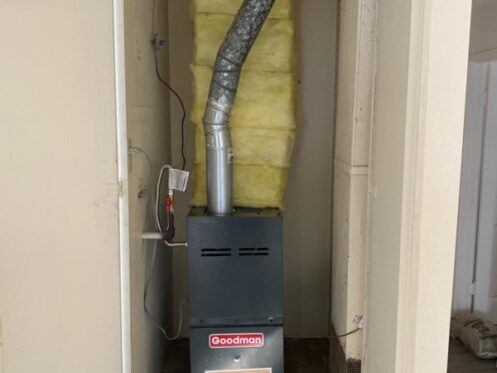Your HVAC system requires regular maintenance in order to continue functioning effectively and at its peak energy efficiency. If your home has a furnace or any other type of central heating, one of the most important maintenance tasks is changing the air filter regularly. Although changing a furnace filter only takes a few seconds, it is still something that many people neglect to do. For this reason, today we’re going to take an in-depth look at furnace filters and how they work. We want to help you understand why changing your filter is essential.
What Does a Furnace Filter Do?
The primary role of a furnace filter is to trap dust and other debris so that they can’t get inside the furnace and air handler. This is very important because otherwise all of that debris could clog or damage many of the different components in both the furnace and the blower fan.
The more basic filters are really only effective at trapping dust and other larger airborne particles. However, if you choose a higher-rated, more efficient filter then it will also help to improve your home’s indoor air quality by filtering out most allergens and pollutants.
How Often Should an Air Filter Be Replaced?
The general rule is that you should always replace your furnace filter once every one to three months. Every two or three months is generally sufficient in times when your heating system only runs occasionally. If your furnace is running for several hours every day, you are usually wiser to change the filter more frequently. We also recommend replacing your filter monthly if you live in an older home or a dusty area as these factors will cause the filter to get dirty and become clogged more quickly.
It is important to note that the filter doesn’t just work with your heating system. If your home has central air conditioning, then you also need to make sure to replace the filter regularly whenever your AC is running since the same filter also works for it.
The best thing you can do is make a habit of checking the condition of your air filter every few weeks. If the filter is covered in a thick layer of debris, you can often clean it and extend its life by simply removing the debris by hand or with a vacuum. However, if the filter looks black or you can’t see through it when holding it up to the light, then it is definitely time to toss it away and put a new filter in.
How to Replace Your Furnace Filter
The air filter is generally always located inside the supply duct where it meets the furnace. Some systems are designed with the air filter located inside of the supply vent (or vents) where air is drawn into the system, but this isn’t nearly as common.
If your filter is located in the supply duct next to the furnace, all you need to do is pull the old filter out and slide the new one into place. For systems where the filter is in the supply vent, you will first need to remove the vent cover to access the filter.
The most important thing when putting the new filter in is to make sure it is facing the correct direction. An air filter only works one way and won’t have any effect if you put it in incorrectly.
All new filters have an arrow that shows which way they should go, and this arrow should always point in the direction of the airflow. If the filter is next to your furnace, then the arrow should point toward the furnace. For filters inside the supply vent, the arrow should point away from the vent cover and toward the inside of the duct.
How a Dirty Air Filter Impacts Your HVAC System
If you don’t change your air filter often enough, it will eventually become clogged to the point where very little air can pass through it. This reduction in airflow puts a huge amount of additional stress on your entire heating system and will lead to higher energy costs while also drastically reducing how much heat the system produces.
A clogged air filter can also create numerous other issues that can seriously damage both the furnace and the blower fan. If you don’t make sure to change your air filter regularly, your furnace and blower motor will typically have a much shorter lifespan and need more frequent repairs due to the added stress.
If the airflow is restricted due to a clogged filter, the blower will have to work much harder to draw air into the system. This leads to increased wear and tear on the blower motor and can also lead to it overheating and possibly burning out.
A clogged air filter can also cause your furnace to overheat, which has the potential to damage its wiring or cause the heat exchanger to crack. In this case, the blower isn’t able to draw in enough cold air. This results in most of the heat that the furnace produces getting trapped inside the unit, which can lead to overheating.
If either the blower motor or the furnace overheats, the furnace limit switch will activate and automatically shut down the system to prevent damage. When this happens, your heating system won’t be able to turn on again until it is sufficiently cooled.
A clogged air filter can also cause numerous problems for your air conditioning system and will often result in the system freezing up. This is why it is also essential that you remember to replace the filter regularly whenever you’re using your AC.
Which Furnace Filter Is Best?
Choosing which air filter to use mostly depends on how much you’re willing to spend and what your main goals are. Most air filters are rated using the MERV (Minimum Efficiency Reporting Value) scale, which measures how efficient the filter is at trapping airborne particles of varying sizes. The higher the MERV value is, the more efficient the filter is and the more expensive it will be.
For residential HVAC systems, you should always use something between MERV 5 and MERV 13. If you are mainly concerned with preventing damage to your HVAC system, then a filter in the MERV 5 to MERV 8 range will be more than sufficient. If you suffer from allergies or are concerned about your home’s indoor air quality, you will want to purchase a higher MERV filter since this will be more efficient at filtering out smaller particles like pollen, pet dander, dust mites and mold spores.
You also have the choice between disposable and washable filters. Most people choose disposable filters as they are more convenient than having to wash the filter every few months. However, washable filters are definitely the cheaper long-term option. There is really no difference in effectiveness between the two types, which means it is mainly a choice between price and convenience.
Victorville’s Heating and Cooling Experts
If you need any type of heating or cooling service in the Victorville area, our crew at Aace's Heating, Air Conditioning & Swamp Coolers has you covered. Our certified technicians work on all types of heating and cooling systems and can take care of any of your installation, repair or maintenance needs. We also handle swamp coolers. Give us a call today if you have further questions about furnace filters or need to schedule any HVAC service.
Services We Offer include:






